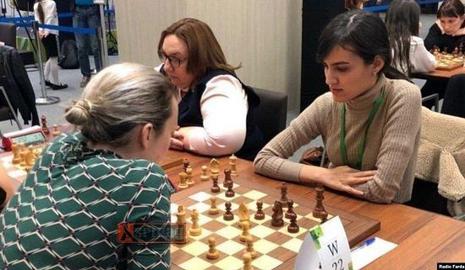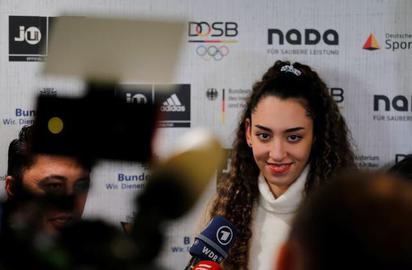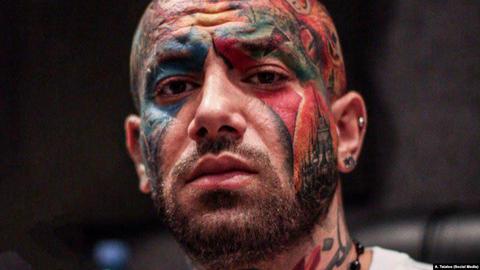Iran’s policy of mandatory hijab has been constantly praised by the Supreme Leader Ayatollah Khamenei but, once again, it has robbed Iranian sports from one of its most brilliant figures.
On January 2, Mehrdad Pahlevanzadeh, the president of Iran’s Chess Federation, expelled female grandmaster Mitra Hejazipour from the national team for removing her headscarf during the World Rapid & Blitz Chess Championship in Moscow. "She has no place in the Islamic Republic's national team anymore," announced Hejazipour.
Hejazi, 27, who lives in France, has since gone public with her feelings about forced hijab in an Instagram post [Persian link]. “My life was dominated by forced hijab,” she writes. “In my opinion forced hijab is a clear symbol of an ideology that considers women the second sex.” She adds that she no longer wants to play the game of pretending to “love hijab” and says she is expressing her beliefs “without any fears.”
In the last month alone, two sports champions and Iran’s leading chess referee have bidden farewell to their country. Alireza Firouzja, the Iranian chess prodigy, took asylum in France because of the Islamic Republic’s ban on competing against Israelis. Shohreh Bayat, a referee with the International Chess Federation (FIDE), appeared at the Women's World Chess Championship without hijab and is afraid of returning to Iran because she might be arrested. And, on January 12, Sara Khadem, a chess International Master and Woman Grandmaster, resigned from the National Chess Team.
Now it is Mitra Hejazipour’s turn.
But it is not only young chess players who are leaving Iran. Defectors include Mobin Kahrazeh, Iran’s 81kg boxing champion, who in early 2019 asked for asylum in Austria, and Saeid Molaei, the international judo champion who took refuge in Germany, both because of the ban on competing against Israelis.
The best known among defectors in 2020 has been Kimia Alizadeh, a Taekwondo athlete who was the first Iranian female athlete to win an Olympic medal. This January she announced that she had left Iran because she didn't want to be part of "hypocrisy, lies, injustice and flattery." In a statement published on social media, she described herself as "one of the millions of oppressed women in Iran whom they've been playing for years" [Persian link]. “I wore whatever they told me and repeated whatever they ordered. Every sentence they ordered I repeated. None of us matter for them, we are just tools." She added that although the government exploited her sporting success politically, officials humiliated her with comments such as: "It is not virtuous for a woman to stretch her legs."
Before the recent defections, the Supreme Leader had repeatedly praised woman athletes who competed at international sports events wearing, as he put it, “Islamic hijab.” For instance, on August 21, 2016, after Kimia Alizadeh won a bronze medal at the 2016 Summer Olympics in Rio de Janeiro, he tweeted a picture of her wearing hijab and wrote in English: “I wholeheartedly express my gratitude to all woman athletes who appear at international events with hijab.”
“Muslim, no touch”
The Instagram post by Mitra Hejazipour, winner of the 2015 Asian Continental Women's Championship, is as follows:
“My life under the yoke of forced hijab started when I was six, with the sentence, ‘Dear niece, wouldn’t it be better to wear your headscarf?’ After that I had to observe hijab all the time, even when I was among the family. I conformed so well that sometimes I was presented as a role model for others.
“I still remember my first foreign trip as a member of the national team [Hejazipour won the silver medal in the World Under-10 Girls Championship in 2003]. I was nine years old. I was stunned by blond-haired Germans who gazed at us with astonishment and kept their distance from the chador-clad guard of the team, who were praying not in a corner but in the middle of the airport. We were all astonished — the Germans by the way we were dressed and us by their relentless gaze.
“I remember my little German friend who wanted to shake hands to congratulate me but the team’s supervisor gestured me not to shake hands and scared the boy away by saying, “Muslim, no touch!” And our pictures wearing headscarves and long manteaux that looked awful on us and attracted everybody’s attention because they were so ugly.
“In my activities in the years that followed I continued obeying the rules that had been planted deep in my mind. For years and years I was not wise to it but now I understand well how, from childhood, they bring us into their favorite game and turn us into puppets to promote their thoughts and their ideals without us being aware of it.
“From religious textbooks from primary school to university, from the pictures and the graffiti on the walls to the brochures and the calendars and from TV programs to street names — they are present at every moment in our lives and, if you look carefully, you shall see that the role played by each one of us in spreading this propaganda is not insignificant. By laying bricks that we might consider small and trivial we help build the edifice of the misfortune that has befallen us. We ourselves have fed this monster. In any case, it might be late, but I have decided that I will no longer contribute to nurturing this hideous monster and I will no longer play the game of ‘we love hijab and have no problems with it.’
“I believe that forced hijab is a clear symbol of an ideology that considers women the second sex. [This ideology] creates a mountain of restrictions for women and denies them their most basic rights. Is this to protect them? No, I say decisively. This is only, and only, to constrain them.”
Related Coverage:
Iran's Tae Kwon Do Olympic Medalist Claims Asylum in Germany, 24 January 2020
Faced with Repression at Home, Iranian Athletes Choose to Migrate, 13 January 2020
Foreign Sports Coaches Are Fleeing Iran, 9 January 2020
Iranian Judo Federation Suspended — And Now all Iranian Sports are at Risk, 18 September 2019
Iranian Judo Champion Forced to Avoid an Israeli Competitor Leaves, Settles in Germany, 2 September 2019
Iran's Female Boxer Makes History in France, 15 April 2019
The Iranian Fugitive Boxer Who Said No to the “Israel Ban”, 25 February 2019
Chess Grandmaster's Brother Also Abandons Iran, 6 October 2017
Iranian Female Chess Grandmaster Abandons Iran for America, 3 October 2017
Meet Iran’s Taekwondo Genius, 4 July 2017
visit the accountability section
In this section of Iran Wire, you can contact the officials and launch your campaign for various problems


























comments